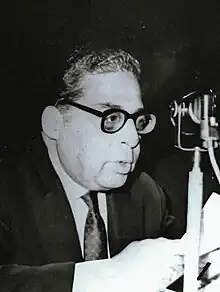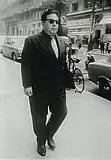Moufdi Zakaria
Cheikh Zakaria Ben Slimane Ben Yahia Ben Cheikh Slimane Ben Hadj Aïssa (12 June 1908 – 17 August 1977), commonly known as Moufdi Zakaria and also referred to by some sources as Zekri Cheikh, was an Algerian activist, nationalist, poet and writer. He wrote the lyrics of "Kassaman", the Algerian national anthem, while in prison in 1955.
Moufdi Zakaria | |
|---|---|
مفدي زكرياء | |
 | |
| Born | Cheikh Zakaria Ben Slimane Ben Yahia Ben Cheikh Slimane Ben Hadj Aïssa 12 June 1908 |
| Died | 17 August 1977 (aged 69) |
| Nationality | Algerian |
| Occupation(s) | Poet, writer |
| Known for | Author of the lyrics of the Algerian national anthem Poet of the Algerian Revolution |
Biography
Zakaria was born on 12 June 1908. Of Mozabite origin,[1] he spent the early years of his life in the M'zab region of Algeria. The name Moufdi was given to him by a school friend.
He became associated with Algerian nationalism and served time in prison for his beliefs from 1937 to 1938. In 1955, he was imprisoned again in Serkadji prison by the French for his political views. There, he wrote a poem called Kassaman or The Pledge.[2] It was said that he wrote the poem on the walls of his cell using his own blood because he had neither pencils nor paper to write in the prison.[3] The poem was later set to music by Mohamed Triki in 1956 and then by Mohamed Fawzi. The final song was heard in 1957. This poem became the Algerian national anthem[4] shortly after 5 July 1962 when independence was achieved.
Zakaria died in 1977 in Tunisia, but his body was buried in Algeria.
Poetry

His university education was in Tunis, Tunisia where he met a number of poets. His first poetry was published in a Tunisian newspaper in 1925.
Moufdi Zakaria uses implied texts in his poems through which readers can get different reflections from his poems. Quran is one of the implied texts in his works, and it is strongly present in his works.[5]
His poetry was believed to be largely influenced by the work of Egyptian poet Ahmed Shawqi.[6]
Legacy
Zakaria's poetry has left a great influence on Algerians to this day. Noumérat – Moufdi Zakaria Airport in Ghardaïa is named in his honour.[7] His name was also given to a cultural centre built in 1984.[8]
Portrayals in film
A film was made on him in 2012 by Saïd Oulmi, titled "Moufdi Zakaria, Poet of the Revolution".[9]
References
- "The Amazigh languages that disturb the Algerian power".
- Historical Background Archived 29 April 2014 at the Wayback Machine, Algeria-UN.org, accessed March 2010
- ""Kassaman," anthem to the glory of Algerian Revolution". Algeria Press Service. 5 July 2012. ProQuest 1024162031.
- According to the Algerian Constitution of 1963, Article 75.
- Dr. Yusuf el-Ayip (15 June 2016). "Mechanism for Evoking the Quranic Text and Its Connotations in Moufdi Zakaria's Poems".
- Poetry and Letters Magazine, Issue No.4, October 2015, pp.58-66 (Arabic)
- AIP and Chart for Aéroport de Ghardaïa / Noumérat – Moufdi Zakaria (DAUG) from Service d'Information Aéronautique – Algerie (in French)
- "Palais de la Culture Moufdi Zakaria".
- ""Moufdi Zakaria, Poet of the Revolution" screened in Paris". Algeria Press Service. 20 May 2012. Archived from the original on 14 April 2018.